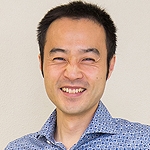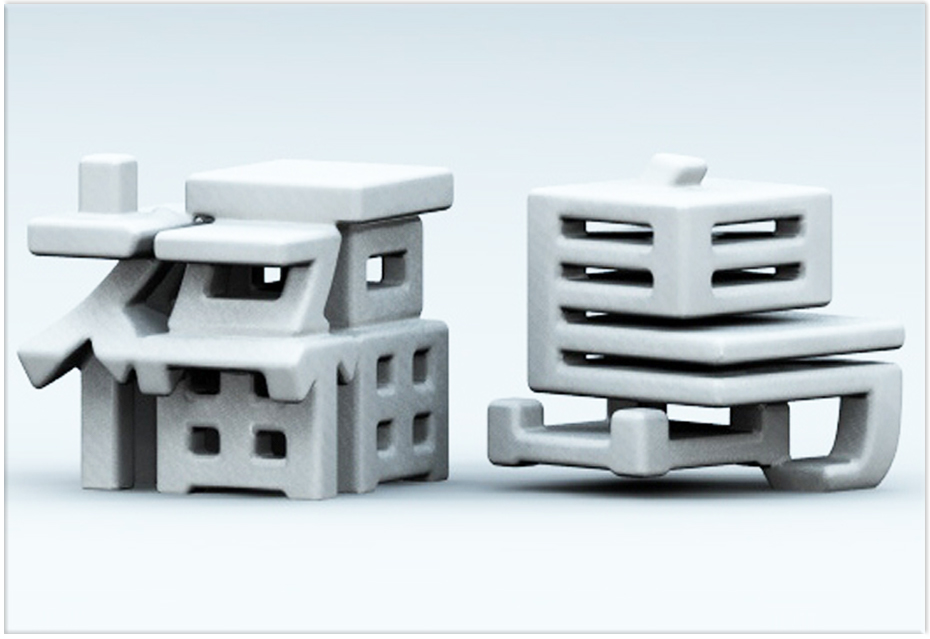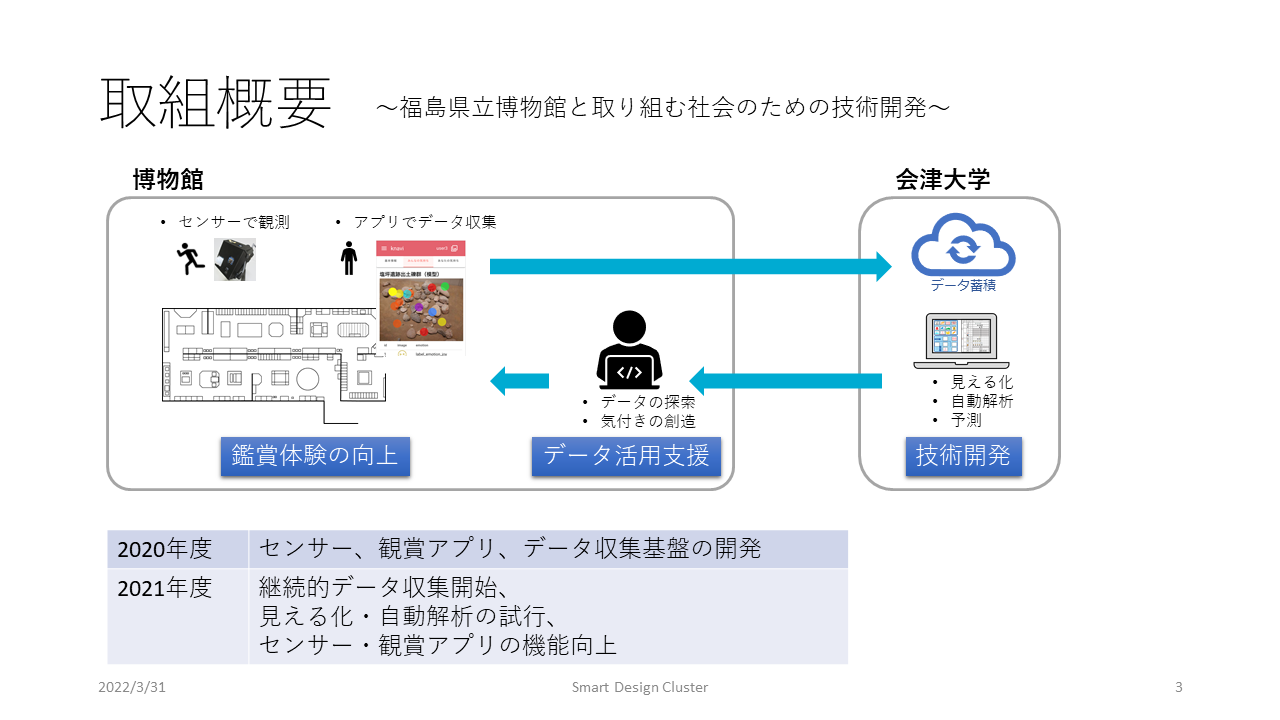
YOSHIOKA Rentaro
Professor, CChair of the Graduate Department of Information Technologies and Project Management
- Affiliation
- Department of Computer Science and Engineering/Division of Information Systems
- Title
- Professor, CChair of the Graduate Department of Information Technologies and Project Management
- rentaro@u-aizu.ac.jp
- Web site
- http://www.u-aizu.ac.jp/~rentaro
Education
- Courses - Undergraduate
- FU15 Introduction to Software Engineering, SE05 Software Studio, LI12 Creativity Studio, O02 Introduction to Software Development, O03-032 Development of user-oriented user interface based on Active Knowledge Engineering, O03-033 Modeling and Rapid prototyping of 3D objects
- Courses - Graduate
- PMC03 Creativity Development: Approaches and Examples, Software Development Arena: Development of Practical Project Management Skills, Software Development Arena: Renovation of Legacy Information Systems
Research
- Specialization
-
Software
Active Knowledge Engineering, Software Engineering, Programming
- Educational Background, Biography
-
1996 BA International Christian University
1999 MS University of Aizu
2002 PhD University of Aizu
2002-2004 Special Researcher, University of Aizu
2004- Associate Professor, University of Aizu
- Current Research Theme
- human-computer collaboration, active knowledge formats and representations, user-centered software development, expressions with 3D objects, AIDA
- Key Topic
- knowledge representation/reuse, software development education, creativity development, 3D printing, 3D modelling
- Affiliated Academic Society
- ACM、IEEE
Others
- Hobbies
- Climbing, Adventure sports, Making & restoring
- School days' Dream
- Architect
- Motto
- Be creative!
- Messages for Students
- The only path to creativity is to be creative
Main research
- Modelling and 3D Printing of Intelligent Shapes
-
3D Kanji is a 3D symbol for the future society that enhances current flat characters and symbols. Using unique techniques and algorithms, characters can be transformed into completely new sophisticated, intriguing 3D shapes that still resembles the original characters. We are exploring various applications of this family of new 3D symbols, especially new methods to embed more data/knowledge into the form, modelling technologies, 3D printing technologies and identification methods.
- Smart Museum
-
[Mission]
Role: Improve visitor experience at the Fukushima Museum
Target: Visitor support and exhibition design
Value: Improve visitor learning and knowledge acquisition
[Purpose]
Currently, it is difficult to obtain objective data on visitor’s behavior in viewing the exhibits that is necessary for evaluation/improvement.
Also, it is currently difficult to understand the visitor’s learning experience so as to provide necessary support.
To improve the situation, it is desired to be able to objectively grasp visitor’s behavior within the exhibit hall.
Furthermore, it is required to collect visitor’s learning experience without hindering their experiences.
Therefore, a system that objectively measures visitor behavior and supports curators for analysis and interpretation will be developed.
[Goal]
Visitor’s satisfaction in terms of learning improves.
[Scenario]
(1)Realize objective thorough measurement of visitor behavior.
(2)Develop devices/applications for visitors that encourages/induces appreciation of exhibits.
(3)Develop advanced computational methods to analyze and visualize visitor behavior.
(4)Develop a system for curators that encourages analyzing and interpreting the measured/computed visitor behavior.
(5)Develop a system to assist curators in designing exhibitions based on the analysis and interpretation.
Dissertation and Published Works
Doctoral Dissertation
R. Yoshioka, “A Visual Environment for Self-explanatory Specification of Grid-oriented Algorithms”, doctoral dissertation, University of Aizu, 2002.
R. Yoshioka, N. Mirenkov, H. Sekine, K. Noda, “3D Kanji: A new paradigm of 3D objects to exploit additional dimensions of human sense for enhancing expression,” Journal of Visual Languages & Computing, Vol. 28, June 2015, 250-272.
R. Yoshioka, N. Mirenkov, “Visual Computing within Environment of Self-explanatory Components,” The Journal of Soft Computing (Special Issue on Visual Computing), Vol.7, No.1, Springer-Verlag, 2002, 20-32.
R. Yoshioka, N. Mirenkov, “A Multimedia System to Render and Edit Self-explanatory Components,” The Journal of Internet Technologies, Vol.3, No.1, Taiwan Academic Committee, 2002, 1-10.
?
H. Sawai, R. Yoshioka, “An Interface to Elicit and Express People’s Experiences: For Visits to Places”, 10th International Technology, Education and Development Conference (INTED2016), Valencia, Spain, IATED, March, 2016, 1329-1336.
?K. Igarashi, S. Seino, R. Yoshioka, “An Active Knowledge Service for Art Education”, 9th International Technology, Education and Development Conference (INTED2015), Madrid, Spain, IATED, March, 2015, 4636-4644.
?K. Igarashi, S. Seino, R. Yoshioka, “Symbols and Rules for a Self-Explanatory Machine Model”, 2014 IEEE 8th International Symposium on Embedded Multicore/Manycore SoCs (MCSoc), Aizu-wakamatsu, Japan, IEEE, Sept, 2014, 49-54.
?H. Sawai, R. Yoshioka, “A Format for Work Specification”, 2014 IEEE 8th International Symposium on Embedded Multicore/Manycore SoCs (MCSoc), Aizu-wakamatsu, Japan, IEEE, Sept, 2014, 123-127.
?S. Furuya, K. Yanai, R. Yoshioka, “An Analysis Tool for a Programming Contest for High-School Students”, 2014 IEEE 8th International Symposium on Embedded Multicore/Manycore SoCs (MCSoc), Aizu-wakamatsu, Japan, IEEE, Sept, 2014, 132-137.
?A. Suzuki, K. Wakisaka, R. Yoshioka, “A Method and Tool for Empirical and Practical Learning of Algorithms”, 7th International Technology, Education and Development Conference (INTED2013), Valencia, Spain, IATED, March, 2013, 1661-1670.
?N. Mirenkov, R. Yoshioka, K. Kanev, “Social and Educational Aspects of 3D Printing”, Proceedings of 16th International Conference on Humans and Computers (HC 2013), The Humans and Computers Committee, Shizuoka, Japan, Dec, 2013, 1661-1670.
?N. Hishinuma, J. Igari, R. Yoshioka, “A Method to Annotate Programs with High-Level Knowledge of Computation”, Proceedings of 2012 International Conference on Computer Science and Applications (ICCSA 2012), WASET, 2012, pp.469-476.
?Y. Watanobe, R. Yoshioka, N. Mirenkov, “Programming in pictures: a way toward reliable software”, In: Proceedings of the 10th International Conference on Software Methodologies, Tools, and Techniques, 2011, pp.183-197.
?Y. Watanobe, R. Yoshioka, N. Mirenkov, “Programming in Pictures within Filmification Modeling Environment”, In: Proceedings of IEEE Symposium on Visual Languages and Human-Centric Computing, VL/HCC 2011, pp.267-268.




